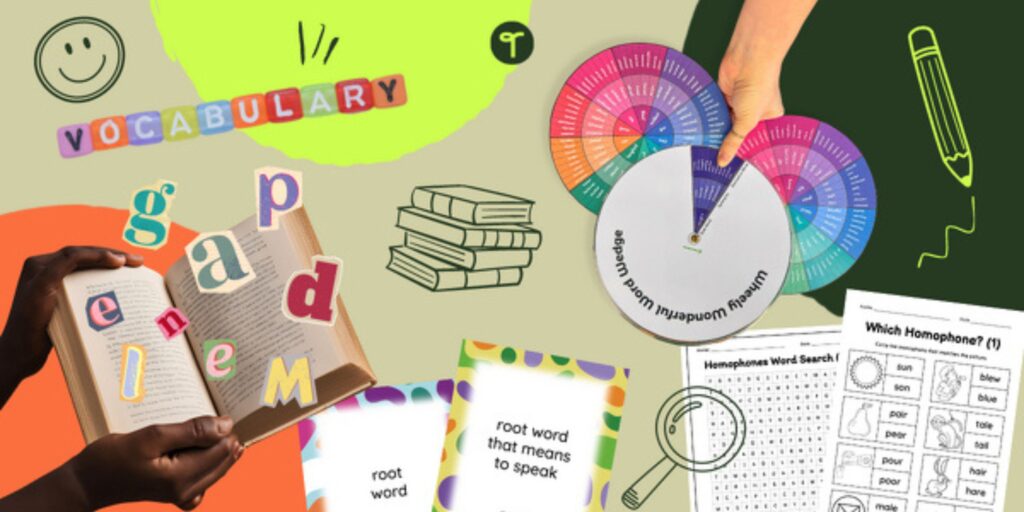Building Vocabulary: 5 Fun Ways to Learn New Words Every Day
Table of Contents
ToggleOne of the most gratifying things related to mastering any language is cultivating vocabulary, especially in English. Many language learners find vocabulary building either tedious or overwhelming. What if learning new words didn’t have to feel like a chore? What if you could slip in new English words and put them into your vocabulary bank every single day without a care in the world? The good news is, it can actually happen, and it can be fun! This blog discusses five creative and fun ways of building vocabulary on a day-to-day basis that will help with motivation and ensure that the excitement inseparably gets tied with the process of learning new words. Whether you are a beginner or an advanced learner, these tips will help you with vocabulary building in effective yet fun ways. Let’s take a plunge into the world of these words and start in a fun way!

1. Building Vocabulary Through Vocabulary Apps
Apps for raised vocabulary have especially become one of the most exciting yet efficient methods of building the vocabulary of any language learner on the move. These applications support fun, immersive, and personalized learning of vocabulary. Popular applications like Duolingo, Memrise, Anki, and Babbel teach new words in various ways, including interactive exercise and quizzes, gamified learning activities, etc.
An outstanding characteristic of spaced repetition is one very central and salient attribute of vocabulary apps. Spaced repetition means going over a word at increasing intervals, which enhances long-term retention. This will assure that the learners do not go through a phase of temporary memorization of the word, but eventually, it will become ingrained within themselves. They can track their progress and set goals for each day while also receiving instant feedback through vocabulary apps, which increases their motivation and is a great way to nurture consistency in the manner of their learning.
Each application offers a different curriculum depending on the proficiency levels with which the user is comfortable. So, juggling with basic vocabulary and becoming strong in advanced terms could be aided with apps that make lessons according to your demand, thus ensuring that the whole process remains simple and entertaining.
Another benefit associated with using the applications is flexibility. Whenever they find free moments-whether there’s a short walk to take, a break at work, or a few minutes of waiting in line-the learners can Practice. Making vocabulary part of daily life allows learners to grow steadily without feeling pressured. Soon enough, behind the common run-of-the-mill words will lie feel-good memories or associations.
2. Building Vocabulary by Reading Regularly
Building a vocabulary by reading is the best method to naturally and enjoyably widen one’s word bank. All the books, newspapers, magazines or otherwise blogs when read continuously expose one to a variety of vocabulary amidst the many things that it portrays. The major plus point of this method is that it makes the new words discoverable through reading. It does help in imbibition of the new words by better understanding their meanings and their usage by listening. It neither requires memorization nor repetition of a word in a sentence context. Instead, it is like being spat out onto a street corner in a real-life situation, helping you to understand how they work differently in different circumstances.
Also, habitually reading brings one into contact with a whole myriad of vocabularies but will have an accompanying experience of those words in altered environments. Some deeper, usage-focused understanding of a word can thus be internalised, making it easier to bring it into one’s own speaking and writing. Reading fiction, or non-fiction, or technical articles-all have different vocabularies that add more to what you have.
One other advantage in boosting one’s vocabulary out of the reading would be the exposure to such words that are very specific to some specialized areas, such as business, science, and technology, thus adding versatility and specificity in one’s vocabulary. This is most effective when the reader interacts with the content by identifying strange words, searching for meaning, then writing it down with example sentences. Vocabulary lists or word journals are also other ways to supplement newly learned words.
Make it possible to have fun doing it: The habit is to read and increase vocabulary in one real-world relevant way while enjoying reading.
3. Building Vocabulary Through Movies and TV Shows
Building Vocabulary With Movies and TV Shows is a technique for adding to your word stock by watching motion pictures and television shows in the English language. Through these techniques, the learners are exposed to different words used in conversations like formal discussions, casual chitchats, and even slang. When watching, learners hear words pronounced well, get to watch body language, and perceive cultural meanings, all of which are important for internalizing and retaining new words.
One of the most significant benefits of building vocabulary through movies and TV shows is being able to hear words in their naturally occurring environment. Movies, unlike textbooks, use vocabulary imbued with real-life context, whereby the examples they furnish are often artificial or somewhat forced. Therefore, with a more contextualized approach to words, one can appreciate the meaning of those words and the way they fit into sentences.
In addition, movies and TV shows offer a large variety of lexicon from many flavors, such as slang and idioms or different dialects. Such elements help the learner to have a deeper understanding and, to an extent, sound more like a native speaker.
For effective vocabulary building through this method, it is good to watch shows with subtitles (in your native language or in English), and pause when you come across a word that you do not know, checking it out. Repetition is important-watching the same scene or episode again helps lock the new word in your memory. So by trying to build some vocabulary around movies and shows, you will also practice listening and learn about culture.

4. Building Vocabulary Through Word Games and Puzzles
The Buildings Vocabulary Using Word Games and Puzzles has to do with the cultivation of vocabulary through fun word activities such as crossword puzzles, Scrabble, word searches, and word-rearing mobile games like Wordscape or WordBrain. They tire your brain out while giving good reinforcement of new words in an enjoyable atmosphere. The fun and relaxing environment brings memory exercises and cognitive skills to enjoy the productivity of acquisition and retention of new vocabulary.
Most of the hallmarks of word games in vocabulary building are the fun characteristics. Games usually introduce a new lexicon in an experiential style, which enhances retention as well. You can create words out of a random assortment of letters, which in Scrabble should provide some input into the thinking required to come up with and learn new words. Crossword puzzles provide a similar type of reinforcement of meanings through the clues, which stimulate one’s vocabulary based on the definitions or contexts of the words.
They have the added benefit of reinforcing spelling, word usage, and sometimes even critical thinking skills. Word games also give instant feedback whereby the player gets to know where they made mistakes and learn from them. An extra element of competitiveness in people playing against each other makes word games a social activity that can engage and motivate players.
By employing word games and puzzles regularly in the learning, you can absorb some vocabulary along with the fun, which makes learning this way enjoyable without feeling like heavy work on a person’s part.
5. Building Vocabulary with Flashcards
Developing Vocabulary through Flashcards- This is where you use flashcards to build a new bank of words. One side of a flashcard contains the word, while the other side contains its definition, pronunciation, and a sample sentence associated with the word. Very simple yet so powerful; it puts learners actively into the process of their vocabulary recall Nd retention: flashcards can be physical or digital flashcards made through, for example, Quizlet or Anki.
The study of a vocabulary flashcard would be active recall, which helps memory consolidation. A learner would be motivated to remember a word by self-testing after a few rounds of using their cards, thus anchoring the word in the mind for a longer time. In addition, flashcards use the spaced-repetitive technique, which implies that a word is reviewed at progressively increasing intervals for frequent exposure to difficult words in the learner’s mind.
An additional advantage is that flashcards can be portable and convenient, whether in digital or physical form; flashcards can go wherever one goes and can be used in short bursts to easily incorporate vocabulary practice into everyday life. In this way, learners who practice regularly with flashcards can track their progress, see what words require further attention, and gradually build their new vocabulary.
Flashcards should contain the word, definition, and example sentence in order to maximize their utility. Flashcards become part of one’s routine in learning vocabulary and using them continuously will automatically embed words. The method by which one learns vocabulary becomes more exciting and productive.

6. Building Vocabulary by Keeping a Personal Word Journal
The method of Building Vocabulary by Keeping a Personal Word Journal consists of entering new words encountered into a word journal and then regularly reviewing them to keep one’s vocabulary current. Through this method, one actively engages the vocabulary by actively writing the unfamiliar word, its meaning, and one or more example sentences. The word journal thus serves as an informal reference tool to assist in anchoring your understanding and remembering new words over time.
The primary benefit of building vocabulary through a word journal is that you become truly responsible for your own learning. Writing down the words and contemplating their meanings puts one into a deeper process than engaging in passive reading or listening. This is truly learning in context, using example sentences or synonyms; not only will you learn the word itself but also its use in various contexts.
A word journal allows continual record-keeping of all the new vocabulary you acquire in life. A place to list the number of new words learned, made to keep an eye on entries of the past, and to check growth on vocabulary newly gained, it is also a tool to compare gaps in one’s vocabulary in order to address the weaknesses that need improvement.
To organize your word journal more effectively, categorize it into emotions, work, travel, academic terms, etc. Update it regularly and revisit it often to reinforce what you absorb. With an ongoing self-word journal practice , vocabulary will continue to grow on its own, arranged meaningfully into stringers that create a personal and also meaningful experience.
Start building your vocabulary today with these fun and effective methods!
Conclusion
Building vocabulary doesn’t really have to be boring or overwhelming as a process. Here are some interesting ways one can use fun and enjoyment to learn more new words: Play vocabulary apps, read regularly, watch movies, enjoy games of words, maintain a word journal, and practice with flashcards. Make your learning a daily habit, and you’ll see substantial progress with time. – Learning daily amazing things from building vocabulary is beneficial for consonance with proficient language development. Making vocabulary building enjoyable makes one not only improve language skills but also develop a joy learning new words every day.
